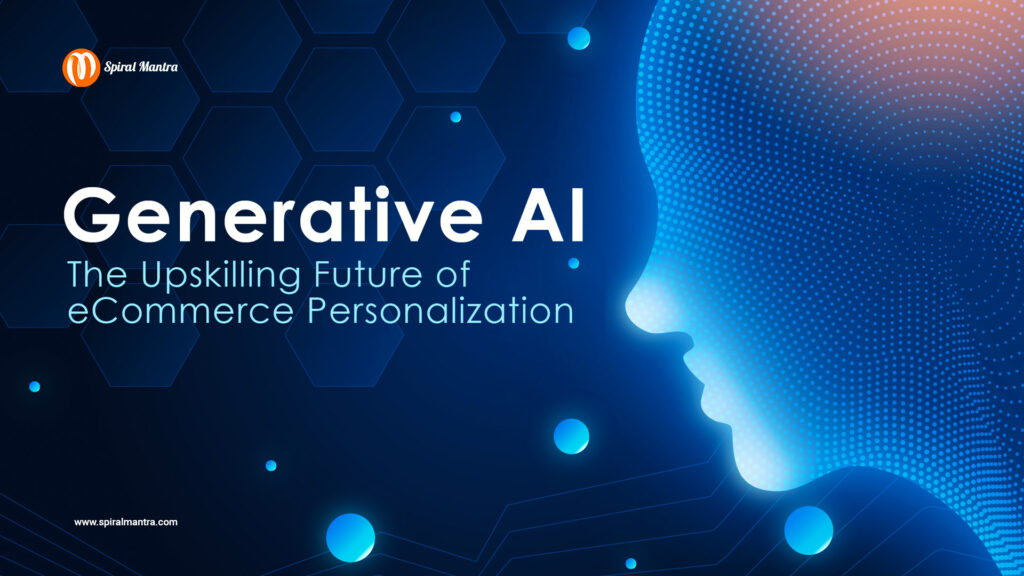How Generative AI Is Transforming E-Commerce
By every means, Generative AI is wholesomely revolutionizing the impact of the e-commerce industry by inviting businesses to revamp their customers’ shopping experiences. Can we appreciate the huge influence of artificial intelligence in e-commerce businesses? Especially if we take the example of IKEA, where users have witnessed how drastically the brand adapts to the latest technological trends and gives them hands-on experiences to visualize their interior design seamlessly.
We really can’t deny the fact that the e-commerce industry has successfully come a long way and is open to any sort of changes to optimize its user experience. Adding the generative AI aspects in the shopping industry makes more sense now, as customers nowadays are more fascinated to try some virtual try-on experiences for better recommendations.
With this blog, we will quickly try to explain the influence of generative AI and how it impacts globally the e-commerce business. But, first, let’s discuss the challenges that the industry faces and how one can overcome them.
Also, we have covered a detailed article on
Big Data in Healthcare!
A Detailed Introduction to "What is Generative AI?"
Generative AI is a category of artificial intelligence focused on the creation of any original content, text, image, music, or even buildings in the virtual world. Generative AI using a variety of sources does not just crunch existing information; it studies large volumes of data and produces a completely new artistic output. Well-known models such as generative pre-trained transformer (GPT) text third generation models, or DALL-E image encyclopedia models, create content that is visually indistinguishable from that created by human hands using advanced computational methodologies through the use of neural network frameworks.
Major Challenges with Its Effective Resolutions
Gone are the days when we used the traditional way of purchasing any product, be it from an online market or offline. Thanks to generative AI, the process has become much easier than ever before. Do you remember the days when makeup lovers went to the offline store to try their hands on new products that arrived at the store? Their major concern resonates with whether the foundation matches my skin tone or will blend seamlessly on my skin. But, now, Sephora, the multinational retailer, has introduced the “Sephora Virtual Artist” feature to let their clients try different makeup brands simply by using their mobile devices.
- Additionally, AI simplifies the process of integration, which makes it a credible source to offer extensive developer support and documentation.
- Another major challenge is user acceptance, but now businesses are trying to gradually introduce their users to advanced AI technological tools and trends, fostering transparency and effectiveness.
- With the introduction of big data and predictive analysis, e-commerce brands can effectively use their unorganized datasets and use them to forecast their sales insights and customer engagement and retention.
Impact of Generative AI on E-commerce
Generative AI is constantly working hard to improve customer personalization and user engagement. One such advantage is customized product recommendations, which allow the capture of customers’ data and assist with information based on their previous purchases, web store-based purchasing behavior, and browsing trends. By adapting user details, generative artificial intelligence can effectively recommend products, raising the purchasing chances.
Moreover, generative AI helps to draft the product details for advertisements, including images and videos, saving time and reducing costs. This feature enables organizations to seamlessly introduce new products while adapting the best of marketing content and strategies.
Another area to focus on where generative AI enhances performance is the groundwork of the customer service sector. Thanks to the amendment of technological tools and platforms, virtual advisors can solve customer queries accurately, resulting in increased customer satisfaction. At the same time, helping companies to achieve interactive solutions by reducing forecasting errors, generated by a large volume of data and inventories.
Use Cases of Generative AI in the E-commerce Industry
Timely adaptation of generative AI aimed to boost the presence of eCommerce on a global platform. With the introduction of efficiency and tailor-made shopping, businesses are working progressively to make their customers satisfied in every aspect of the shopping experience.
- Personalized Content Generation: Before getting hands-on experience with generative AI, retailers used to conduct A/B testing to understand what product image and description would work best and catch engagement. But now artificial intelligence has grabbed all the eyeballs by producing creative content across varied sellers and marketplaces. This method of personalization enhances the probability of conversion and increases customer satisfaction because of the relevant result one gets.
- Virtual Try-Ons and Voice Shopping: With the implementation of effective modules of voice assistants, Generative AI has achieved a lot of appraisals, just by changing the way of shopping. Similarly, with the introduction of virtual try-ons, brands have transformed the way they display their products in front of large audiences. Be it clothing, makeup, or accessories, the deep learning of technology has boosted its efficiency. By implementing the idea of virtual try-ons, companies try to reduce uncertainty, helping businesses to increase their profits.
- Boost search algorithms: Adapting generative AI to e-commerce platforms excessively helps boost search algorithms, improving the concept of search capabilities. For those who don’t know, AI is best known for grasping natural language queries, making it generate more comprehensive, user-friendly searches. But what about the search suggestions? Does AI help in that too? Well, the answer is yes, as machine learning engages and fosters relevant search suggestions, helping online users discover products easily.
- Enhanced Customer Service with AI Chatbots: Having advanced chatbots to deliver 24/7 personalized customer support is a need for any business. Be it finance, retail, e-commerce, or IT, adding generative artificial intelligence chatbots advances operations, while it can handle a wide spectrum of tasks effectively. Be it answering users’ questions, showing the most searched order details, or processing orders, AI-driven chatbots can engage shopaholics to develop meaningful conversations.
How to Implement Generative AI in E-commerce Systems?
On your e-commerce project, implementing generative artificial intelligence is a need of an hour. However, the process will take several steps to complete, while effective integration and value generation are a must to access greater results on time.
Below are the steps that need to be followed:
- Begin by determining the needs and areas of your e-commerce system where generative AI can offer solutions. The areas include virtual try-ons, personalized recommendations, or effective customer service.
- Next up is to gather relevant data that fits your business goals from categories like customer behavior, transaction history, and product details. Here’s the need for predictive analytics, which is crucial to clean and organize the data for consistency and accuracy.
- Having the right approach to technology selection is a must to generate engaging results. Upon selecting the right AI tools, like OpenAI’s GPT or Google Cloud’s AI engines, you can move further for seamless API integration and custom solutions.
- Develop a strategy to work on different models to cater to the needs of your eCommerce brand. The process involves training the artificial intelligence models on your data, allowing them to create precise outputs. This step is needed to generate accurate customer recommendations.
- Thereafter, test and evaluate the AI system before deploying it to your e-commerce platform. Look for its performance and try to collect ample feedback to implement necessary adjustments.
- Once everything falls into the right place, roll out the AI on your e-commerce project and try to monitor it continuously for high conversion rates and user experience.
Generative AI E-commerce: Live Case Studies
- Amazon’s AI-driven Product Recommendations: When it comes to using generative AI, Amazon is a big name in boosting its recommendation engine. From analyzing customer behavior to having an in-depth understanding of customers’ browsing patterns, artificial intelligence plays a crucial role in real-time product suggestions. Allowing Amazon not only enhances customer shopping experiences but also boosts conversion rates, indicating the efficiency of machine learning in driving sales.
- Virtual Dressing Room by H&M: This premium fashion brand uses AI to complement personalized recommendations and features to engage with users. The H&M’s virtual dressing room features allow customers to try their favorite piece of clothing and try it virtually to know how it will look on them. Generative AI has already begun an intuitive trend, allowing customers to pick garments based on their body types and helping them to make more precise decisions before purchasing.
- Sephora AR Makeup Feature: Sephora, a premium beauty and cosmetics retailer, has introduced an AI-driven tool to transform how customers engage and try makeup virtually. This generative AI feature is best known for creating engagement on the portal, plus their sales have massively increased across their online stores. This innovation has a preliminary increase in customer satisfaction by featuring a personalized shopping experience.
Conclusion
As generative artificial intelligence continues to upskill and transform e-commerce, enhancing user experience with the products and streamlining operations, It is quite evident that implementing these technologies is not just an option anymore but has become an inevitability for staying competitive.
Looking forward to transforming your e-commerce business?
Contact Spiral Mantra for a quick call to discuss your requirements and begin your journey toward innovation and growth.


